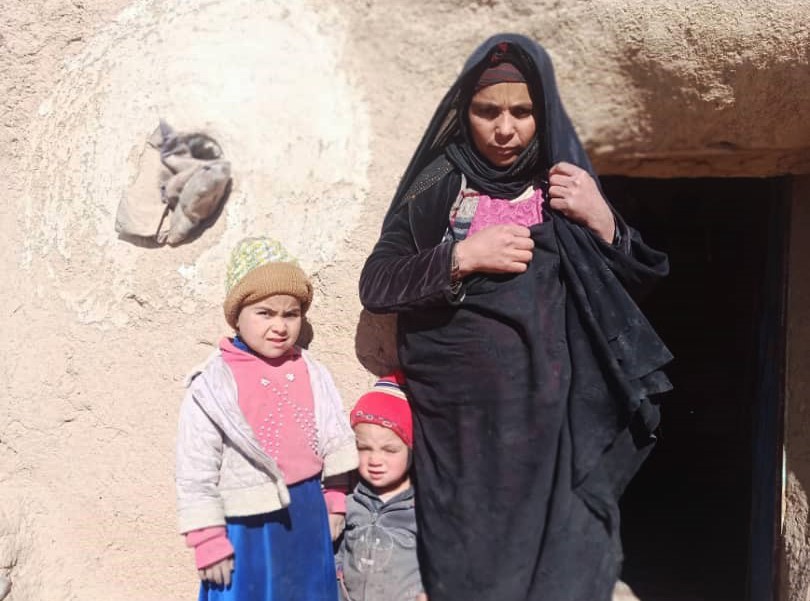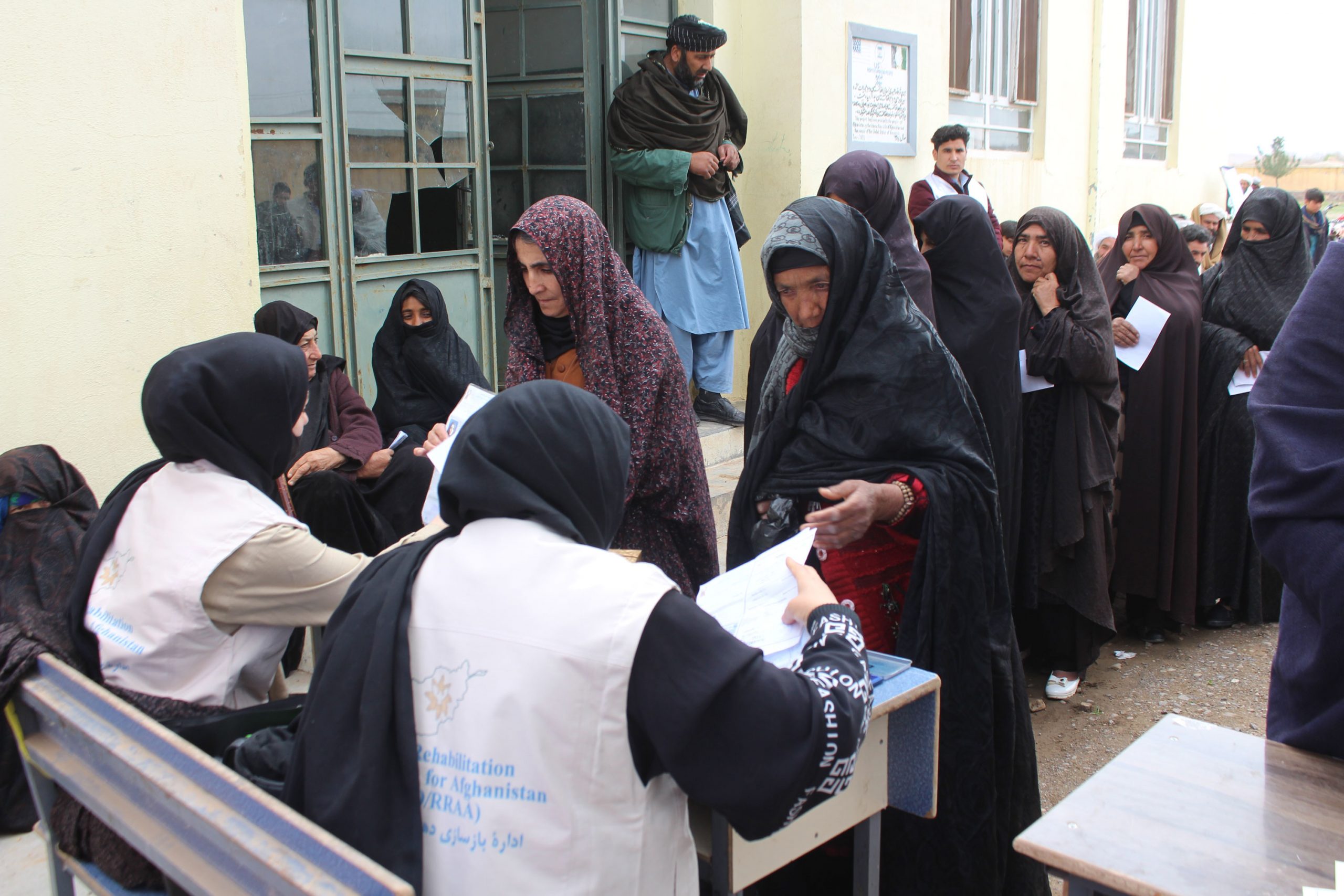Children are hungry and mothers are desperate in Afghanistan’s latest crisis
A combination of decades of conflict, years of drought, and economic turmoil has led to a crippling food crisis and is pushing millions of children and their families into extreme poverty.
By ChildFund Australia
In the remote villages of Herat Province, where Afghanistan shares its border with Iran and Turkmenistan, hunger is a daily burden for many children and their families.
For widowed or single mothers such as Maliha* (pictured below) and their children, they are barely surviving.
Maliha lives with five of her children on a barren plateau in Herat. Her children, who are under the age of 12, and in urgent need of food and nutrition.
Maliha and her children have been living on bread and tea.
During the harsh Afghan winter earlier this year, Maliha lost her five-year-old son Amir*. He died in his sleep during a night when the temperatures dropped below freezing. Maliha found his little body, frozen, in the morning.
The days before his death, Amir had been undernourished because of a lack of food and sick with flu-like symptoms, but Maliha could not afford to take him to the doctor.
“I wish no mother to suffer the way I have,” Maliha said. “I lost a part of my heart, just because of poverty. What a mother feels in her heart after losing her children cannot be described with words.”
A combination of decades of conflict, recent years of drought, and worsening economic instability since late 2021 has led to a crippling food crisis in Afghanistan.
Nearly 9 million Afghans are at risk of starvation, according to the United Nations World Food Program and Food and Agriculture Organization. Two million children are already malnourished.
There are few job opportunities for women in Afghanistan, and for widowed or single mothers like Maliha the chances of earning a stable income to support and feed their children are almost impossible.
Maliha and her children have been surviving on a few dollars a week, which they earn from gathering licorice roots near their village.
The roots grow deep in the ground, and it is difficult for Maliha’s children to dig them out with their little hands so they often wait until a tractor works the ground and brings the roots to the surface.
It takes up to three days for Maliha and her children to collect four kilograms of roots, which is the amount they need to earn US$1 to buy basic foods such as bread, rice or sugar. If they are lucky, Maliha and her children eat rice once a week.
Desperate circumstances, heartbreaking choices
The United Nations Development Programme estimates that 97 per cent of Afghanistan’s population – almost 39 million people – could fall below the poverty line this year without emergency assistance.
In Herat Province, where Maliha and her children live, the impact of the food crisis is particularly concerning. A disproportionate number of households – 15 per cent – compared to the rest of the country (5 per cent) are run by women, mostly single mothers or widows, living with little to no income.
Not long ago in Maliha’s village there were about 100 families, many of whom farmed wheat for a living. Families who were better off would often give a third of their harvest to poorer families. This is how everyone in the community survived.
Years of drought have made it impossible to continue the agricultural and farming practices that once sustained communities like Maliha’s. Today, there are less than 30 families in Maliha’s village.
Many families have fled their homes. Those who can afford it have left their village in search for work and food elsewhere, while the poorest families like Maliha’s have had no choice but to stay.
Afghanistan’s economy, which has long been heavily dependent on foreign aid, is on the brink of collapse.
The withdrawal of international troops from Afghanistan in 2021, and the subsequent takeover of the Taliban, led to countries such as the US and Germany suspending aid, and the World Bank and the International Monetary Fund halting payments.
Basic services such as healthcare and education that were dependent on international support have been disrupted. Vulnerable families like Maliha’s, who once received support from the government, are now facing desperate circumstances and have been forced to make heartbreaking choices to survive.
Without money to buy food for their children, parents have been forced to take their children out of school to work or marry.
Maliha had no choice but to agree to an arranged marriage for her 13-year-old daughter to pay off a debt.
Young girls who enter marriages are more likely to face a future of isolation, poor mental health, abuse and sexual exploitation, and high rates of maternal mortality.
Emergency support for women and children
ChildFund Alliance member, WeWorld, is one of the few international humanitarian organisations working in Afghanistan in response to the crisis.
WeWorld’s National Coordinator in Afghanistan, Jailan, described the situation on the ground as “one of the worst emergencies” he had seen in the 12 years of working with humanitarian groups in the country.
“A lack of basic human and civil rights, and the impacts of poverty and drought have really broken people,” he said. “Families are desperate for food. Children are living in extreme poverty and do not have even a third of the food that they should be eating a day.”
“The stories are heartbreaking.
“When I heard of Maliha’s story I was shocked and devastated that this had happened.”
ChildFund Australia is working with WeWorld to respond to the crisis in Afghanistan by providing emergency cash transfers to vulnerable families in Herat Province, specifically women-led households with children.
*Individuals’ names have been changed.
The cash provided to families will be enough for them to buy food and water, and pay for health care for their children during the crisis.
Cash transfers have long been used as an efficient and trusted means to help families facing conflict and disaster.
They provide families with flexibility and uphold their dignity, allowing them to decide and buy the food – and other essentials – they need.
Your support can help save the lives of children in Afghanistan.
The Ready for Life (R4L) project is a three-year program, equipping 267 young people across Laos with planning, communication, responsible decision-making and confidence to become community leaders.
The project, implemented by ChildFund in Laos, is being run across 30 target schools in the Xiengkhouang, Houaphanh Provinces and in the capital city, Vientiane. So far, the project has worked with 4,053 young people to educate them on youth-related issues, including digital literacy and sexual and reproductive health.
Cindy, 18 years old, has been a part of the R4L program for the last three years and is now one of the trainers. In 2019, she was selected to take part in the ASEAN Children’s Summit, and after this experience, she decided to continue to work with ChildFund.
“I enjoyed being a youth trainer and representative from my school and did a lot of activities with my fellow team members a lot. When I first applied to be a youth trainer, I just wanted to try something new and have fun with my friends. But after taking part, I learned that the knowledge I have was valuable. I realised that I could help many other children from other schools and provinces,” she said.
After building her confidence, Cindy has been to many forums, regularly speaking and advocating for the rights of children in her community. She said that she has enjoyed the opportunities she has gained since being a part of the program. “Since I was a youth volunteer in ChildFund in Laos, I have joined various activities. I participated in the Lao children’s Forum 2019 in Vientiane capital and the Asian Children’s Summit 2019 in Bangkok, Thailand as a Lao representative.”
Through these opportunities, she has been able to develop her confidence and leadership skills. She has shown that she is highly committed to her work and over time she has become a community role model, inspiring her peers to challenge themselves and also take part in the project.
Cindy is very passionate about empowering women and young girls and will be speaking about this topic at the Lao Youth Talks event. But she knows public speaking is an area of improvement for her.
“It is very challenging for me to talk in front of people on stage. I think every day about what lessons I want the audience to gain after listening to my speech. From when I was a young girl, I believed in women’s empowerment. Every woman can make their own choice, can earn money and should feel valued. Because of that attitude, I was chosen to be a youth speaker in the Lao Youth Talks.”
“I am proud of what I’ve done and worked so hard until this day, but I have to continuously improve and develop myself for the better. I think that learning is a lifelong journey. If we stop learning, our lives will not go so far. I love to study new things and improve my skills.”
Cindy has taken part in many of the project activities as part of the R4L project. With support from the team, young people like Cindy can effectively advocate for children’s rights across Laos. They can work together to solve the issues facing young people and come up with creative solutions.
In the future, the project will continue to work with youth volunteers to provide the knowledge and skills to empower them to become leaders in their communities.
This project is supported by the Australian Government through the Australian NGO Cooperation Program (ANCP).
































